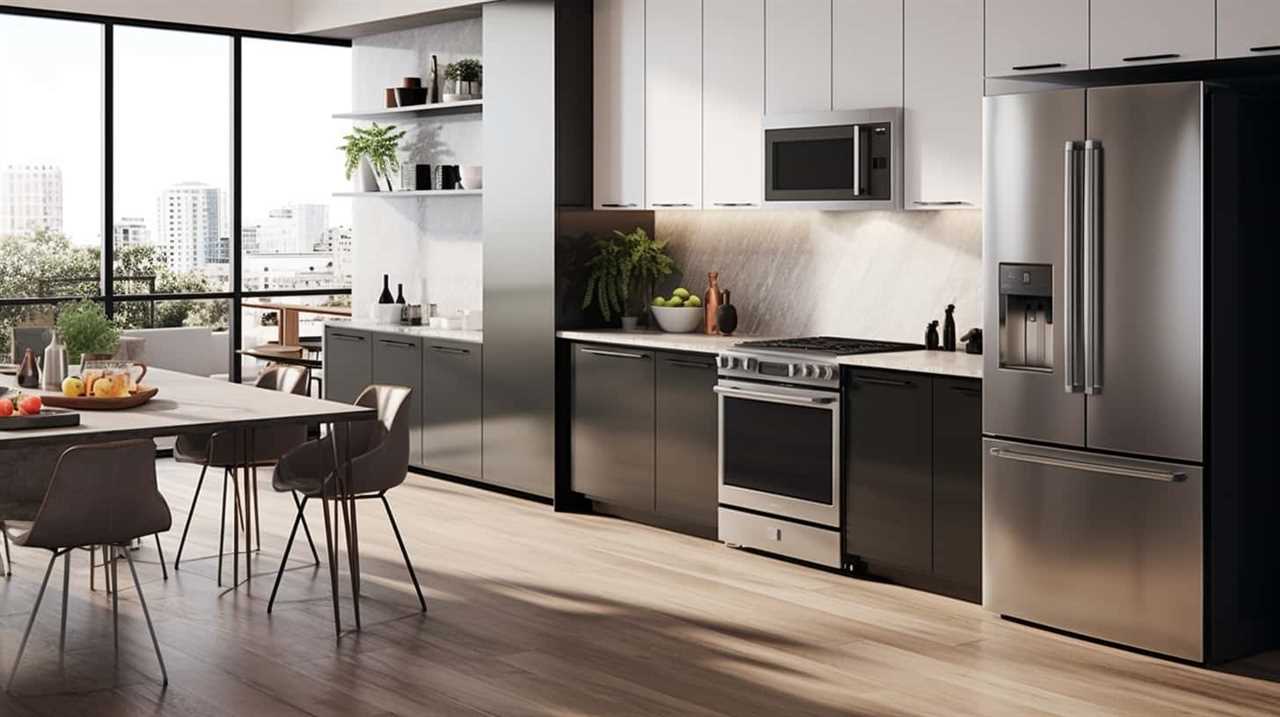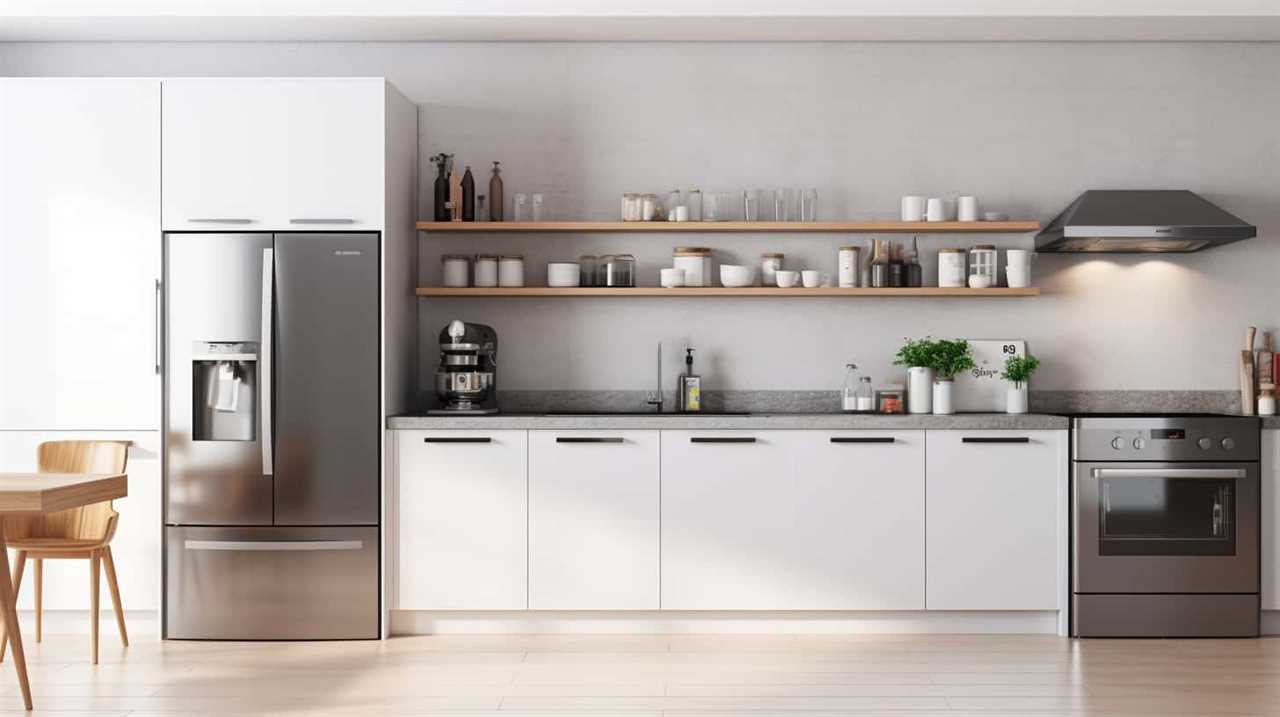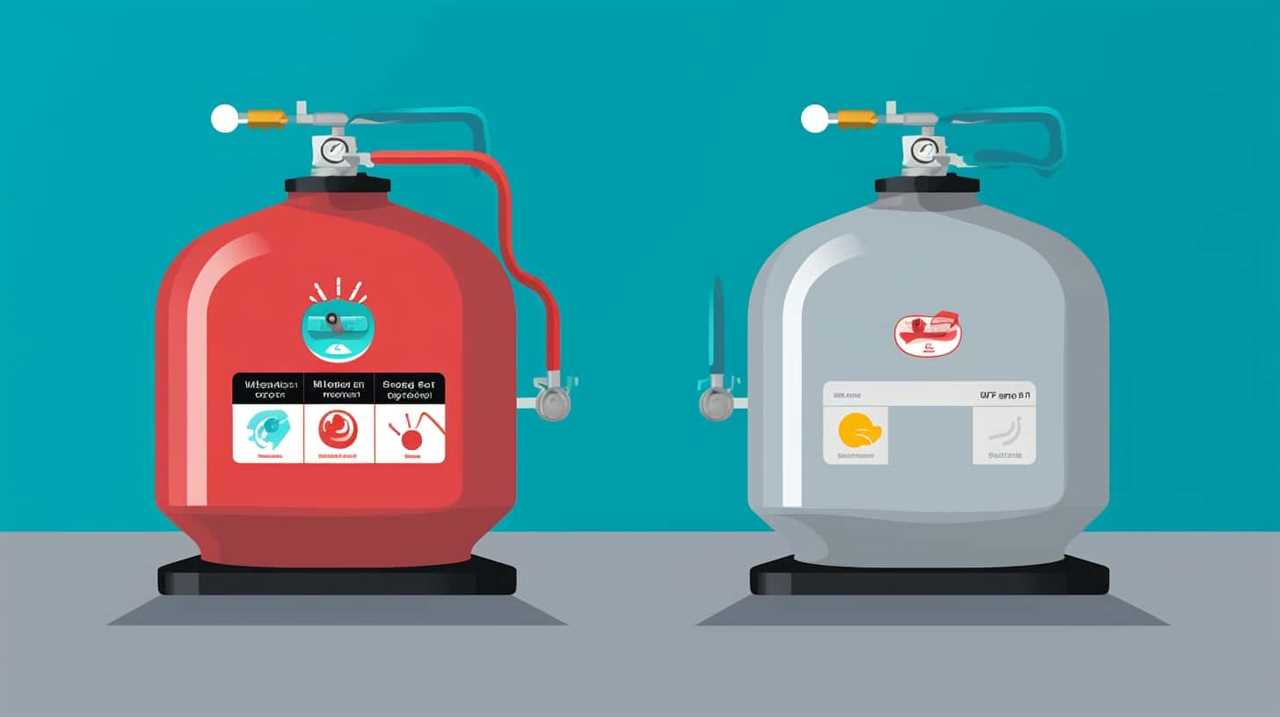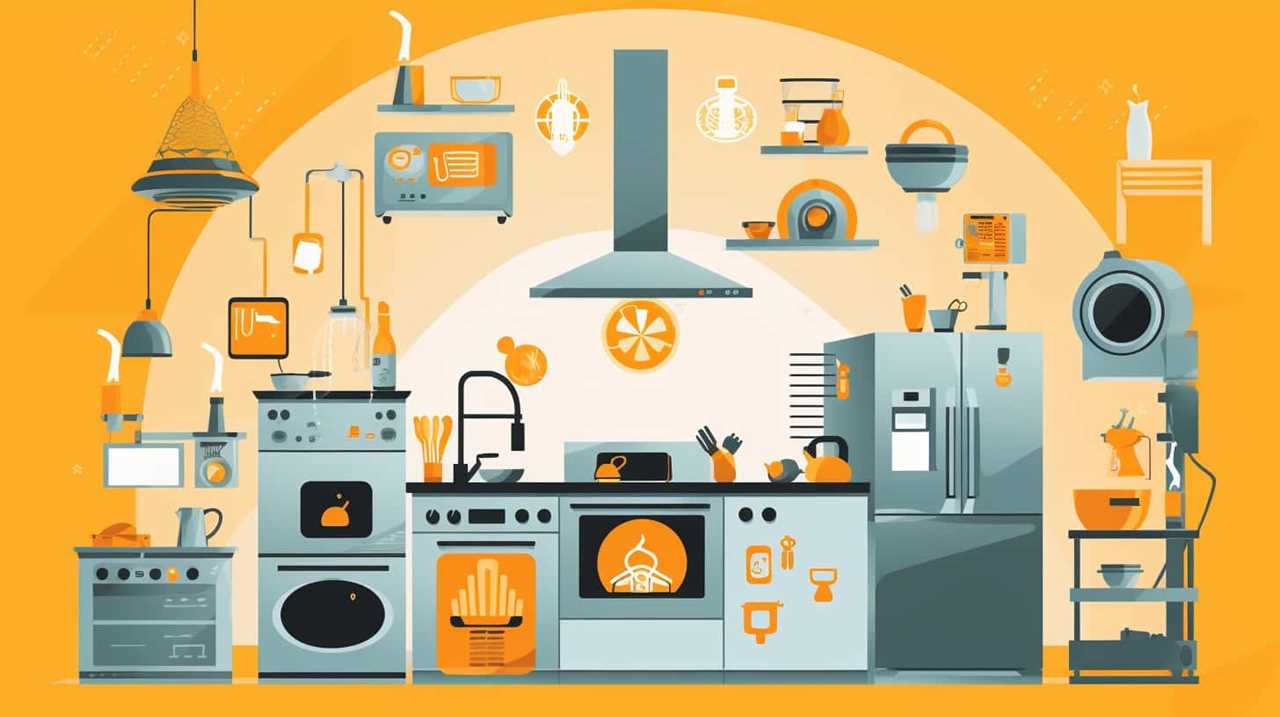Curious to know what a computer appliance really is? Don’t worry, we’ve got you covered! In this article, we will delve into the definition, characteristics, key features, and functionality of computer appliances.
We’ll also delve into the advantages of using them and discuss future trends in their development. But that’s not all! We’ll also share important considerations when choosing a computer appliance and provide tips for optimizing their performance.
Get ready to master the world of computer appliances!
Key Takeaways
- Computer appliances combine hardware and software to efficiently perform specific tasks.
- They eliminate the need for manual installation and configuration of software.
- Computer appliances offer improved security and a more consistent user experience.
- They prioritize a streamlined user experience with intuitive interfaces.
Definition of Computer Appliance
A computer appliance is a device that combines hardware and software to perform specific tasks efficiently. It’s designed to simplify the process of deploying and managing software applications. Unlike traditional computers, which require manual installation and configuration of software, computer appliances come pre-installed with everything needed to run the desired applications. This eliminates the need for complex setup processes and reduces the potential for errors.

The benefits of using appliance-based computing are numerous. First, it allows for faster deployment of software applications, as the appliances come pre-configured with the necessary settings. This saves time and resources.
Second, appliance-based computing offers improved security, as the devices are specifically designed and hardened against common vulnerabilities.
Additionally, appliance-based computing provides a more consistent user experience, as all users are working with the same standardized hardware and software configurations.
Characteristics of Computer Appliances
Computer appliances possess distinct features that set them apart from traditional computers. These characteristics contribute to their functionality limitations, which in turn can have an impact on productivity. Here are four key traits that define computer appliances:

- Simplified Interface: Computer appliances typically have a user-friendly interface that simplifies the interaction with the device, allowing users to perform specific tasks without the need for technical expertise.
- Limited Customizability: Unlike traditional computers, computer appliances have limited customization options. They’re designed to perform specific functions and aren’t easily adaptable to other tasks or software.
- Compact Form Factor: Computer appliances are often compact in size, making them portable and easy to integrate into different environments.
- Enhanced Security: Computer appliances prioritize security features to protect sensitive data and prevent unauthorized access, helping to mitigate potential risks and vulnerabilities.
Understanding these characteristics is essential in comprehending the key features of appliances in computers, which we’ll explore in the next section.
Key Features of Appliance in Computers
Now, let’s delve into the key features of appliance in computers to gain a comprehensive understanding of their functionality and capabilities.
Appliance in computers offers several functionality benefits. Firstly, they’re designed to perform specific tasks efficiently and effectively, which increases productivity and saves time.
Secondly, they’re user-friendly with intuitive interfaces, making them accessible to a wide range of users. Additionally, they’re highly reliable and stable, ensuring consistent performance without the need for frequent maintenance.

Some popular examples of computer appliances include routers, firewalls, and network switches. These devices are essential for network management and security.
In the next section, we’ll explore the functionality of computer appliances in more detail, highlighting their role in enhancing computing experiences.
Functionality of Computer Appliances
When it comes to the functionality of computer appliances, there are a few key points to consider.
Firstly, the purpose of computer appliances is to perform specific tasks or functions, such as data storage, networking, or security. Examples of computer appliances include routers, firewalls, and backup servers.

The benefits of using computer appliances include increased efficiency, enhanced security, and simplified management of specific tasks.
Purpose of Computer Appliances
Our purpose in creating computer appliances is to provide users with efficient and user-friendly tools for specific tasks. These appliances offer several advantages:
- Simplified functionality: Computer appliances are designed to perform specific tasks, eliminating the need for complex configurations or technical expertise. Users can simply plug in the appliance and start using it right away.
- Enhanced performance: By focusing on specific functions, computer appliances are optimized to deliver high performance and efficiency. They’re built with specialized hardware and software, allowing them to outperform general-purpose computers in their designated tasks.
- Streamlined user experience: Computer appliances are designed with a user-centric approach, prioritizing ease of use and intuitive interfaces. This ensures that users can easily navigate and operate the appliance without any technical complications.
- Increased reliability and security: Computer appliances are built with dedicated hardware and software components, which enhances their reliability and security. With fewer components and a focused purpose, appliances are less prone to malfunctions and are often equipped with robust security features.
Examples of Computer Appliances
Moving forward from the discussion on the purpose of computer appliances, let’s explore some examples of their functionality.
Computer appliances have a wide range of common uses, from simplifying everyday tasks to enhancing specialized processes. One common use is the network attached storage (NAS) appliance, which allows for centralized data storage and sharing in a network. Another example is the firewall appliance, which provides network security by filtering incoming and outgoing traffic. Other computer appliances include web servers, email servers, and virtual private network (VPN) appliances.

Advantages of computer appliances include their ease of use and setup, as well as their dedicated functionality, which ensures optimal performance for specific tasks. However, they also have some disadvantages. They may lack the flexibility and customization options of traditional computers, and in some cases, they may require specialized knowledge for maintenance and troubleshooting.
Despite these drawbacks, computer appliances continue to play a crucial role in various industries, offering efficient and reliable solutions for specific needs.
Benefits of Using Appliances
Computer appliances offer several benefits in terms of their functionality. Here are four advantages of using appliances:
- Simplified Operations: Appliances are designed to perform specific tasks, making them easy to use and operate. They come pre-configured and ready to use, eliminating the need for complex setup processes.
- Increased Efficiency: With dedicated hardware and optimized software, computer appliances are built to perform specific tasks efficiently. This results in faster processing speeds and improved overall performance.
- Enhanced Security: Appliances often come with built-in security features, such as firewalls and encryption, to protect sensitive data and prevent unauthorized access. This ensures a higher level of security compared to general-purpose computers.
- Reliability and Stability: Appliances are engineered to be stable and reliable, minimizing the risk of system crashes and downtime. They undergo rigorous testing and optimization, providing a dependable solution for critical tasks.
Using computer appliances provides these advantages, enhancing functionality and improving the overall computing experience.

Advantages of Using Computer Appliances
There are several benefits to using computer appliances. One advantage is their simplicity and ease of use. Computer appliances are designed with a specific purpose in mind, making them straightforward and user-friendly. They often come with pre-installed software and require minimal setup, which saves time and effort.
Another benefit is their reliability and stability. Computer appliances are built with hardware and software components that are optimized to work together, resulting in a stable and efficient performance.
Additionally, computer appliances offer enhanced security features. Many appliances have built-in security measures, such as firewalls and encryption, to protect against cyber threats.
These advantages make computer appliances a convenient and dependable choice for various tasks.

Moving forward, it’s important to understand the differences between computer appliances and other devices.
Differences Between Computer Appliances and Other Devices
To further explore the topic, let’s now delve into the distinctions between computer appliances and other devices. Here are four key differences:
- Purpose: Computer appliances are designed for specific tasks and applications, while traditional computers are more versatile and can perform a wide range of functions.
- Complexity: Computer appliances are typically simpler and easier to use, with a more intuitive interface, compared to traditional computers that require more technical expertise.
- Maintenance: Computer appliances often have built-in features for self-monitoring and troubleshooting, reducing the need for manual maintenance, unlike traditional computers that require regular updates and security patches.
- Scalability: Computer appliances can be easily scaled up or down to meet the changing needs of a business, making them more flexible and cost-effective, whereas traditional computers may require additional hardware and software upgrades.
These distinctions highlight the advantages of using appliance-based computing in businesses, such as increased efficiency, reduced maintenance costs, and improved user experience.
Examples of Popular Computer Appliances
Now let’s take a look at some examples of popular computer appliances.

These appliances are commonly used for specific functions and are designed to perform tasks efficiently.
Understanding the functionality of these appliances can help us better grasp their importance in the world of computing.
Common Computer Appliances
We have identified several common computer appliances that are widely used and popular among users. These appliances have their own pros and cons, and they can have a significant impact on productivity and efficiency.
Here are four examples of popular computer appliances:

- Printers: Printers allow users to generate hard copies of documents and images. They can save time and make it easier to share information, but they can also be costly to maintain and may require frequent ink or toner replacements.
- Scanners: Scanners are used to convert physical documents into digital files. They can help streamline document management and improve organization, but they may have limitations in terms of scanning speed and resolution.
- External Hard Drives: These devices provide additional storage space for computer users. They offer the advantage of portability, allowing users to easily transfer and backup their files. However, the reliance on physical hardware can also be a drawback if the device gets lost or damaged.
- Speakers: Speakers enhance the audio experience of computers, allowing users to enjoy music, movies, and other multimedia content. They can greatly improve the quality of sound, but they may take up desk space and can be an additional expense.
Understanding the functionality of these appliances is crucial to make informed decisions about their usage and optimize their benefits.
Functionality of Appliances
Let’s dive into the functionality of popular computer appliances and explore how they enhance our computing experience.
Computer appliances are designed to provide specific functions and tasks, offering simplicity and convenience to users. However, it’s important to note that these appliances have functionality limitations compared to traditional computers. They’re optimized for specific tasks, which means they may lack the flexibility and versatility of a full-fledged computer system.
Despite these limitations, computer appliances can have a significant impact on productivity. For example, appliances like routers and firewalls ensure network security and enable efficient internet connectivity. Similarly, appliances like printers and scanners streamline document processing. By focusing on specific tasks, computer appliances enhance efficiency and simplify complex processes.

Now, let’s explore the benefits of using appliance-based computing.
Benefits of Using Appliance-Based Computing
One of the major advantages of appliance-based computing is the ability to easily deploy and manage software applications. This can greatly simplify the integration challenges faced by organizations.
Here are four key benefits of using appliance-based computing:
- Streamlined deployment: With appliance-based computing, software applications come pre-configured on a hardware appliance, eliminating the need for complex installation and configuration processes.
- Simplified management: Appliance-based computing offers centralized appliance management tools, allowing administrators to easily monitor and control multiple appliances from a single interface.
- Enhanced security: Appliances are designed with built-in security features, providing a secure and isolated environment for running applications.
- Improved performance: Appliance-based computing optimizes the hardware and software components, resulting in better performance and efficiency.
How Appliance Technology Enhances Efficiency
Appliance technology enhances efficiency by streamlining processes and optimizing performance through the integration of hardware and software components.

One of the key benefits of appliance technology is its ability to simplify complex tasks and automate routine processes. By providing a dedicated and specialized solution, appliances can perform specific functions more efficiently than general-purpose systems. This results in improved performance and faster response times.
Additionally, appliance technology reduces the complexity of managing and maintaining systems by providing a standardized and pre-configured solution.
However, implementing appliance technology can also present challenges. Customizing and integrating appliances into existing infrastructure may require additional resources and expertise. Furthermore, ensuring compatibility and security between different appliances can be complex.
Despite these challenges, the benefits of appliance technology in terms of efficiency and performance make it a valuable solution for many organizations.

Security Features in Computer Appliances
When it comes to computer appliances, security features play a crucial role in protecting sensitive data.
Encryption is an essential security measure that ensures data is securely transmitted and stored, safeguarding it from unauthorized access.
Additionally, firewalls act as a barrier, monitoring and controlling incoming and outgoing network traffic to prevent malicious attacks.
These security features are imperative in maintaining the integrity and confidentiality of information in computer appliances.

Importance of Encryption
While it’s true that encryption plays a crucial role in ensuring the security of computer appliances, there are several other important security features to consider as well. Encryption importance can’t be understated, as it helps protect sensitive data by converting it into an unreadable format that can only be deciphered with a decryption key.
However, data protection goes beyond encryption. Here are four other security features to consider:
- Access controls: Setting up user authentication and authorization protocols to limit access to sensitive information.
- Antivirus software: Detecting and removing malware that could compromise the security of computer appliances.
- Intrusion detection systems: Monitoring network traffic for any suspicious activity that could indicate a cyber attack.
- Regular software updates: Keeping computer appliances up to date with the latest security patches to address any vulnerabilities.
Considering these security features alongside encryption strengthens the overall protection of computer appliances.
Now, let’s delve into the role of firewalls in securing computer systems.

Role of Firewalls
As we continue our discussion on security features in computer appliances, one important aspect to consider is the role of firewalls.
Firewalls play a crucial role in protecting computer networks from unauthorized access and potential threats. They act as a barrier between a trusted internal network and an untrusted external network, monitoring and controlling incoming and outgoing network traffic based on predetermined security rules.
By analyzing data packets and filtering out malicious or suspicious content, firewalls help prevent unauthorized access, malware infections, and data breaches. The benefits of using firewalls include enhanced network security, improved privacy protection, and reduced risk of cyber attacks.
Additionally, firewalls can provide network administrators with valuable insights into network traffic patterns and potential vulnerabilities.

Integration of Appliance Solutions in Business Environments
We integrate appliance solutions in business environments to enhance productivity and streamline operations. The integration of these solutions can be challenging, but the impact on productivity is significant. Here are four ways in which appliance solutions can improve business environments:
- Centralized Management: Appliance solutions allow for centralized management of various systems, reducing the complexity and increasing efficiency.
- Enhanced Security: By integrating security appliances, businesses can protect their networks and data from potential threats, ensuring a secure operating environment.
- Scalability: Appliance solutions offer scalability options, allowing businesses to easily expand their infrastructure as their needs grow.
- Simplified Maintenance: With appliance solutions, businesses can simplify the maintenance and support of their systems, reducing downtime and increasing overall productivity.
As we look to the future of computer appliance development, there are exciting trends on the horizon that will further enhance business environments.
Future Trends in Computer Appliance Development
In the realm of computer appliance development, we anticipate exciting future trends that will revolutionize business environments. The integration of appliance solutions in business environments will continue to evolve, providing businesses with more efficient and effective tools to streamline their operations. Here are some key trends we can expect to see in the future of computer appliance development:
| Future Trends | Description | Benefits |
|---|---|---|
| Artificial Intelligence Integration | Computer appliances will be equipped with advanced AI capabilities, allowing for intelligent automation and decision-making. | Enhanced efficiency and productivity |
| Internet of Things (IoT) Connectivity | Computer appliances will be seamlessly connected to IoT devices, creating a network of interconnected devices that can communicate and collaborate. | Improved data sharing and real-time monitoring |
| Enhanced Security Features | Computer appliances will have robust security measures to protect sensitive data from cyber threats. | Increased data protection and reduced risk of breaches |
| Cloud Integration | Computer appliances will integrate with cloud platforms, allowing for seamless access to data and applications from anywhere. | Improved flexibility and scalability |
These future trends in computer appliance development will undoubtedly transform the way businesses operate, leading to increased productivity, efficiency, and security.

Importance of Appliance-Based Computing in the Digital Era
The integration of appliance solutions in business environments has become increasingly important in the digital era. Appliance-based computing offers a range of benefits that make it an essential component of modern organizations. Here are four key reasons why appliance-based computing is vital in today’s digital landscape:
- Simplified Management: Appliance solutions provide a pre-configured and self-contained system that requires minimal setup and maintenance, reducing the burden on IT teams.
- Improved Security: Appliance-based computing offers enhanced security features, such as built-in firewalls and encryption, ensuring the protection of sensitive data.
- Increased Efficiency: By streamlining processes and eliminating unnecessary complexities, appliance solutions enable businesses to operate more efficiently, saving time and resources.
- Scalability and Flexibility: Appliance-based computing allows organizations to easily scale their infrastructure as needed and adapt to changing business requirements.
Considerations When Choosing a Computer Appliance
When selecting a computer appliance, it’s important to carefully consider various factors.
The functionality of the appliance should be a top consideration. Determine what specific tasks or functions you need the appliance to perform and ensure that it aligns with your requirements.
Additionally, consider the benefits of using appliances. They’re often designed with specialized software and hardware configurations that optimize performance for specific tasks. This can result in improved efficiency and productivity.

Another important consideration is compatibility with existing systems and software. Ensure that the appliance you choose is compatible with your current setup to avoid any potential issues.
Lastly, consider the long-term viability of the appliance. Evaluate factors such as warranty, support, and the vendor’s reputation to ensure that you’re investing in a reliable and sustainable solution.
Tips for Optimizing the Performance of Computer Appliances
To optimize the performance of computer appliances, we can implement several strategies that enhance their efficiency and productivity. Here are four tips for optimizing computer performance and troubleshooting computer appliances:
- Regularly clean and maintain the hardware components of the computer appliance. This includes dusting off the fans and vents, cleaning the keyboard and mouse, and ensuring that all cables and connections are secure.
- Keep the operating system and software up to date. Regularly installing updates and patches can improve performance and fix any bugs or issues that may be affecting the computer appliance.
- Manage and optimize the storage space on the computer appliance. Remove unnecessary files and programs, use disk cleanup tools, and consider upgrading to a larger storage capacity if needed.
- Monitor and manage the computer appliance’s performance using task manager or other monitoring tools. Identify any resource-intensive processes or programs and take appropriate actions to optimize their usage.
Frequently Asked Questions
How Does Appliance Technology Enhance Efficiency?
Appliance technology in computers enhances efficiency by optimizing energy consumption. It offers advantages such as improved performance and reduced power usage. However, there are drawbacks like potential hardware limitations. Overall, appliance technology positively impacts efficiency in computer systems.

What Are Some Examples of Popular Computer Appliances?
Some popular computer appliances include routers, modems, and external hard drives. These devices enhance efficiency by providing specialized functions and easy integration with computers.
What Are the Security Features in Computer Appliances?
When it comes to security in computer appliances, our focus is on data protection and network security. We ensure that your information remains safe and secure, giving you peace of mind.
How Are Appliance Solutions Integrated in Business Environments?
Appliance solutions are integrated in business environments by overcoming implementation challenges and offering benefits over traditional IT systems. These solutions provide a streamlined approach, improved security, and simplified management, making them ideal for businesses.
What Are the Future Trends in Computer Appliance Development?
Future advancements in computer appliance development will have a significant impact on our daily lives. These advancements will revolutionize the way we interact with technology, making our lives more efficient, convenient, and interconnected.

Conclusion
In conclusion, computer appliances are specially designed devices that provide specific functions and features for users. They offer advantages such as convenience, simplicity, and optimized performance.
As technology continues to advance, the development of computer appliances will likely follow suit, offering even more innovative and efficient solutions. It’s crucial to carefully consider the specific needs and requirements when choosing a computer appliance to ensure optimal performance.
Remember, ‘don’t judge a book by its cover’ and explore the potential of these devices in the digital era.










